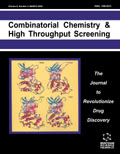To find the most relevant journal, please insert appropriate keyword to facilitate search.
Search Results: CCHTS

Combinatorial Chemistry & High Throughput Screening
ISSN: 1386-2073 (Print)
eISSN: 1875-5402 (Online)
- Target identification and validation
- Assay design, development, miniaturization and comparison
- High throughput/high content/in silico screening and associated technologies
- Label-free detection technologies and applications
- Stem cell technologies
- Biomarkers
- ADMET/PK/PD methodologies and screening
- Probe discovery and development, hit to lead optimization
- Combinatorial chemistry (e.g. small molecules, peptide, nucleic acid or phage display libraries)
- Chemical library design and chemical diversity
- Chemo/bio-informatics, data mining
- Compound management
- Pharmacognosy
- Natural Products Research (Chemistry, Biology and Pharmacology of Natural Products)
- Natural Product Analytical Studies
- Bipharmaceutical studies of Natural products
- Drug repurposing
- Data management and statistical analysis
- Laboratory automation, robotics, microfluidics, signal detection technologies
- Current & Future Institutional Research Profile
- Technology transfer, legal and licensing issues
- Patents
In these respective subject areas, Combinatorial Chemistry & High Throughput Screening is intended to function as the most comprehensive and up-to-date medium available. The journal should be of value to individuals engaged in the process of drug discovery and development, in the settings of industry, academia or government.
Special Issues With Active Call for Papers
Artificial Intelligence Methods for Biomedical, Biochemical and Bioinformatics Problems
Recently, a large number of technologies based on artificial intelligence have been developed and applied to solve a diverse range of problems in the areas of biomedical, biochemical and bioinformatics problems. By utilizing powerful computing resources and massive amounts of data, methods based on artificial intelligence can significantly improve the reliability and performance of many devices and platforms for biomedical, biochemical and bioinformatics applications. Techniques including machine learning, deep neural networks, artificial intelligence, optimization algorithms,... see more
Emerging trends in diseases mechanisms, noble drug targets and therapeutic strategies: focus on immunological and inflammatory disorders
Recently infectious and inflammatory diseases have been a key concern worldwide due to tremendous morbidity and mortality world Wide. Recent, nCOVID-9 pandemic is a good example for the emerging infectious disease outbreak. The world is facing many emerging and re-emerging diseases out breaks at present however, there is huge lack of new drugs/strategies to combat these disorders. Repurposing of the drugs (screening of the used drug for a different purpose) molecules has been a key... see more
Integrating Network Pharmacology and Traditional Medicine: A New Perspective in Drug Mechanism Research
Network pharmacology is a network construction and network topology analysis strategy that combines pharmacology and pharmacodynamics. In recent years, network pharmacology has emerged as a powerful tool that can be integrated with pharmacology. Natural products commonly function in multicomponent, multitarget, and multipathway systems. Some examples encompass Ayurveda, traditional Chinese medicines (TCM), African traditional medicine, and Brazilian traditional medicine.Network pharmacology explores the complex interaction between drugs and diseases by connecting traditional medicine and evidence-based medicine.With the... see more
Intersection of Chemical Graph Theory and Molecular Sciences
Chemical graph theory has become increasingly critical in molecular sciences, offering advanced capabilities in the modeling, design, and analysis of chemical structures via molecular graphs. This special issue aims to not only explore these fundamental aspects but also to push the boundaries of CCHTS applications. By integrating the concept of metric dimension—a tool to measure the uniqueness of a structure's chemical properties—this issue will highlight innovative approaches in studying chemical biological activity, profiles, product reactivity,... see more
Exploring Spectral Graph Theory in Combinatorial Chemistry
Scope of the Thematic Issue: Combinatorial chemistry involves the synthesis and analysis of a large number of diverse compounds simultaneously. Traditional methods rely on brute force experimentation, which can be time-consuming and resource-intensive. Spectral Graph Theory, a branch of mathematics dealing with the properties of graphs in relation to the eigenvalues and eigenvectors of matrices associated with the graph, offers a unique perspective for studying molecular structures and relationships. Objectives: To explore the application of... see more